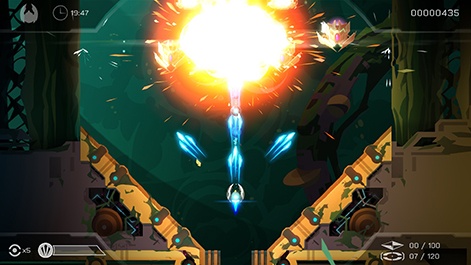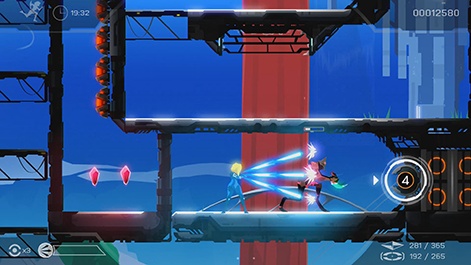Brighton-based indie studio FuturLab launched Velocity 2X on PlayStation platforms back in September 2014. The fast-paced time and score attack title was critically acclaimed on release and was played by millions thanks to it being part of Sony's PlayStation Plus programme. Each month, users who splash out for this service get a few games entirely free to charge. Velocity was in this scheme.
The game has come to other platforms - it was published on Steam and Xbox One by Activision's Sierra label and a Switch port is coming shortly via Curve Digital.
At the start of the week, the studio's managing director James Marsden took to Twitter to talk about how FuturLab had been trying to get a sequel - Velocity Supernova - published but had run into severe difficulties. The chief problem, going on the developer's posts, is that the game was played by millions of people but not enough people actually paid for it.
We caught up with Marsden at Gamescom to find out more about the situation.
How would you assess the performance of Velocity 2X since its September 2014 release?
It's done amazingly well. My measure of success having been in the industry for 15 years is the opportunity to do it again. As a studio, that's our measure of success. If we can continue doing what we love, then that's a great thing. That's true for all entertainment industries. It's hit-driven. The best you can hope for is to continue doing what you love. Having developed a suite of games with Sony support - that we own the IP for - we've been able to continually reap the rewards of our own IP. Working with Curve on a great new platform, we're able to bring the game again to new players. It's our first time on Nintendo.
Why did you decide to open up about the challenges of getting another Velocity game made? In games, it's common to hear stories from developers about trying to get a new project made five years down the line - it's unusual, but refreshing, to hear about it at the time.
It was a moment of truth. We've been asked countless times for a follow-up to Velocity 2X from our fans. We've attempted many times to get one signed. I asked myself what our fans would think if - like you say - ten years down the line, we say that there was a Velocity 3 but it never got made. If I was a fan I'd prefer to know that so if there was an opportunity for me to do something about it, then I'd like that. I put myself in the shoes of a fan in ten years. There is a tangible opportunity to help if our fans want to help.

How do you feel about services like PlayStation Plus following Velocity 2X? Based on FuturLab's tweets, it sounds like the game's userbase is impressive, but the number of paid copies is what publishers are having issues with before signing Velocity Supernova.
Velocity 2X has done magical things for us because so many people played it. We've had business come to us, we've had publishers call us up and offer us work on the strength of Velocity. If we hadn't had that PlayStation Plus deal, that wouldn't have happened. In other aspects of our studio, it's been wonderful, and like I said on Twitter, there are many hidden benefits that people don't see. This wasn't me complaining about PlayStation Plus - it was simply saying that we know there are fans who want to see a sequel and that we tried. These are just the facts.
Are you able to share what proportion of the Velocity 2X audience paid for the game?
No. That's essentially the issue. Vast people have played us but they got it for free. If we were working on another game and Sony offered us a PlayStation Plus deal, there's a good chance we'd take it because of the exposure. It's our IP that we're building. The current game you are working on is a marketing campaign for the next one. That's the way we see it. The more fans we can take under our wing and give a good experience to; the more secure we are going to be for the future.
Why is working with a publisher so important to you? FuturLab owns the Velocity IP and the series has got a fanbase so you could - in theory - crowdfund and self-publish.
Publishing is hard. We've self-published ten titles and I thought we were doing a good job of it but it's really hard to reach the end result. We can create a buzz and get people talking within our echo chamber of press and other developers, but if you want to reach an actual consumer that will purchase your game, it's a full-time job for a team of people. We're focused on making the game. The democratisation of digital platforms is great for developers but it's an expertise - it's an entire industry on the other side of things that developers don't want to do. We've self-published ten times and we'd prefer to work with a publisher.

Based on your tweets, it sounds like the Curve Digital-published Switch edition of Velocity 2X is the last chance fans have to get a sequel. What's the hope for that version?
That people agree it's the definitive version and that it does equally well review-wise. There's no reason why it shouldn't. The fact you can take it on the move, play a level for five minutes and really sit down and rinse it on the TV or in the handheld mode - it's so beautiful. There's no compromise.
Aside from the issues around the game's paying userbase, is a shift in the indie publishing scene also responsible? What labels are after and the bets they are taking now is definitely different to when Velocity 2X first launched in 2014.
I can only speak from our experience and we're very blinkered about what we're working on. We don't spend a lot of time looking at the indie scene. I wouldn't really know what that means today. We have a lot of mentors in the industry. In my experience, we've been doing FuturLab for 15 years now - I just see it as a console hardware cycle thing where we've been fortunate to have been there initially at the start of PlayStation Minis, PlayStation Mobile, PlayStation Vita, PlayStation 4 and now it's PSVR. Those are when the platform holders really need to write the cheques.
What's the next year looking like for FuturLab? Or does that depend on how this Switch version performs?
No. We have lots of things in the pipeline. We're currently on our second PSVR title, Mini Mech Mayhem We're heading into finishing up on that - no release date just yet. And we've always got irons in the fire. Yesterday was not a miserable cry for help. It was an intention to share facts with our fanbase about the reality of another Velocity game is based on this. It's not related to FuturLab's stability or success in the future. We'd love for this to do great. We'd love Curve to continue working with us.
Editors' note: We've had a few people say that this interview misses a few key questions about Velocity Supernova being made. For the record, we did ask Marsden for some more information about FuturLab's pitch for the game, as well as a rough idea of how much money the studio wanted or needed to get the title made. He declined to comment so we omitted those questions from the Q&A.
















